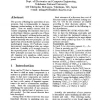Free Online Productivity Tools
i2Speak
i2Symbol
i2OCR
iTex2Img
iWeb2Print
iWeb2Shot
i2Type
iPdf2Split
iPdf2Merge
i2Bopomofo
i2Arabic
i2Style
i2Image
i2PDF
iLatex2Rtf
Sci2ools
COLING
1992
1992
Zero Pronouns as Experiencer in Japanese Discourse
The process of finding the antecedent of zero pronoun, that is indispensable to Japanese language understanding, is the topic of this paper. Here we mainly concern with discourses comprising two sentences that are in a subordinate relation, especially one of them describes the agent's volitional action and the other describes the reason of the action. We propose basically two new principles: (1) The agent of an action should experience a certain psychological reason, (2) Predicates reporting someone's psychological state are categorized into 1) weakly or 2) strongly bound to the expected point of view. Combination of these principles accounts for some problematic Japanese zero anaphora, which cannot be accounted for by the theories so far proposed.
Agent's Volitional Action | Certain Psychological Reason | COLING 1992 | COLING 2008 | Japanese Language Understanding |
Related Content
| Added | 07 Nov 2010 |
| Updated | 07 Nov 2010 |
| Type | Conference |
| Year | 1992 |
| Where | COLING |
| Authors | Hiroshi Nakagawa |
Comments (0)

